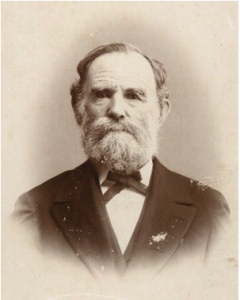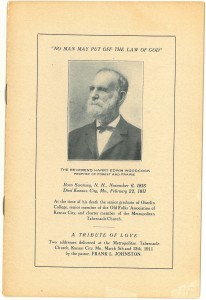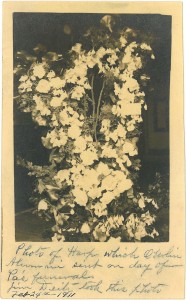Project Group: Mimi Stern, Rachel Sacks, Rebecca Debus
Student Editor: Rebecca Debus
In 1836, abolitionist and women’s rights advocate Angelina Grimké wrote in her antislavery Appeal to the Christian Women of the South, “I know you do not make the laws, but I also know that you are the wives and mothers, the sisters and daughters of those who do; and if you really suppose you can do nothing to overthrow slavery, you are greatly mistaken.”1 Though women during this time had little ability to change their lives through official channels, the idea that they had the ability to influence the men around them was a common one. This collection examines the relationships that Rev. Henry Edwin Woodcock, an Oberlin Theological Seminary graduate and pastor, had with the various women in his life, as revealed through his correspondence with his future wife, his sister, and his two daughters. The letters span almost half a century, and give insight into the various spheres which women in nineteenth-century society could inhabit, all while remaining “wives, sisters, and daughters.” These letters do often reaffirm traditional gender roles and relations, but they also demonstrate the emerging possibility of more egalitarian relationships. The women in Henry Woodcock’s life were intelligent, engaged, and highly capable individuals, but while they never seemed to let their gender limit them, nor allow Henry himself to limit them because of it, they were often still defined by their gender, revealing the still fledgling nature of America’s first-wave feminisms.

Henry Edwin Woodcock was born in Swazey, New York, on 6 November 1816.2 He was the third of fourteen children born to his parents David and Patty Woodcock. When he was about five years of age, his family left their ancestral home in Swazey and moved via prairie schooner to the relatively unsettled town of Independence, New York.3 Henry’s family were farmers and he was expected to continue in that occupation; however, in his teens he had a religious experience that led to his conversion and his subsequent desire to enter the ministry. To this end, he removed to Ohio where he attended the newly founded Oberlin College from 1839 to 1848.4 At that time, Oberlin College was the only institution of higher education in the country to educate students regardless of race or gender. It was also a center of religious revivalism, temperance, and abolition, all of which reflected Henry’s own beliefs. Henry Woodcock was fortunate enough to know and study under many of the college’s early notables, including its first three presidents: Asa Mahan, Charles Grandison Finney, and James A. Fairchild.5 His younger sister, Lucy Woodcock, later attended the college alongside him. Henry received his A.B. from Oberlin College in 1845 and graduated from the Theological Seminary in 1848. He was then ordained to the Congregational Ministry and began serving various pastorates in New York and Pennsylvania until 1868. In 1850, Henry married his first wife, Elizabeth Hurlbut, with whom he had one son, Arthur. After Elizabeth’s death, Henry married his second wife, Lucy Hatch Thayer, in 1853, with whom he had three children: Charles, Elizabeth, and Ellen.6

In 1868, Henry left New England and moved to Kansas where he became the founder of a Congregationalist church in the town of Tonganoxie, and served as its pastor for thirteen years. In 1881 he moved to Lawrence, Kansas to live with his younger daughter, Nellie Woodcock Upton, and joined Plymouth Church. He finally settled in Kansas City, Missouri in 1886, founding the Southwest Tabernacle Congregational Church there two years later. Though he retired from his work as a pastor, he was still an active member of the church, even preaching a sermon on his ninety-third birthday. He died in Kansas City on 2 February 1911 at the age of 94.7

A committed social reformer and a constant advocate for that which he believed was moral and right, Henry Woodcock supported many of the social changes that were leading to a more egalitarian United States. Despite the fact that the temperance and abolition movements were early arenas wherewomen could achieve influence and authority equal to men’s, Henry never directly addressed women’s rights in his letters. Although his various writings reveal a tremendous amount of love and respect for the women in his life, he still tended to define them by essentialist gender roles. Moreover, some of the women in his life seem to embrace that vision for themselves, particularly earlier in the nineteenth century. However, as time goes on, these gendered assumptions appear less and less in Henry’s letters, underscoring the changes in notions about women’s proper sphere. Through Henry Woodcock’s letters with his wife, sister and daughters, both the progress and the limits of first-wave feminisms become clear.
1Angelina Emily Grimké. 1836. Appeal to Christian Women of the South . New York, NY: American Anti-Slavery Society.
2Oberlin College Archives, The Henry Edwin Woodcock Papers. Series 2. Writings, 1987/67. 1989/141. RG 30/81.
3Oberlin College Archives, The Henry Edwin Woodcock Papers. Series 4. Files Relating to the Woodcock Family, Compiled by the Donor, 1980.
4Oberlin College Archives. “Henry Edwin Woodcock Papers Finding Guide.” web address, accessed 07/07, 2015.
5Oberlin College Archives, The Henry Edwin Woodcock Papers. Series 4. Files Relating to the Woodcock Family.
6Oberlin College Archives, The Henry Edwin Woodcock Papers. Series 2. Writings.
7Oberlin College Archives, The Henry Edwin Woodcock Papers. Series 3. Miscellany.